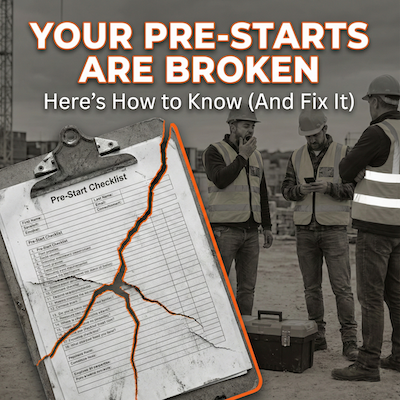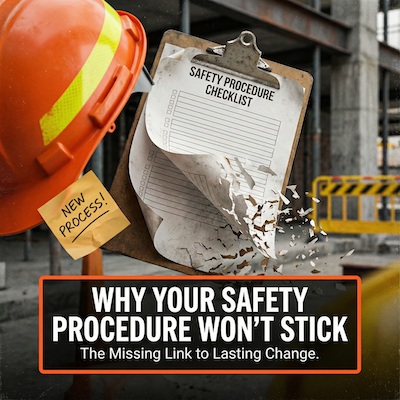The Alarming Prevalence of Mental Health Issues in the Construction Industry
The construction industry is one of the most vital sectors of the Australian economy, employing a significant percentage of the workforce. As a result, workplace safety remains a top priority for businesses and senior leaders. However, when it comes to identifying the causes of construction accidents, the focus has traditionally been on physical factors such as equipment malfunctions or failure to follow safety procedures.
Yet there is a surprising link between employee mental health and construction accidents that is often overlooked, and it's time we shed some light on this hidden connection.

The Prevalence of Mental Health Issues in the Construction Industry
The construction industry is no stranger to mental health challenges. In fact, workers in this field are more likely to experience mental health issues than employees in other industries. Reasons behind this high rate include long hours, heavy workload, tight deadlines, and the physically demanding nature of the job.
Additionally, the industry has historically struggled with a "tough it out" mentality that discourages open conversations about mental health. As such, the potential impact of these issues on workplace safety has been, for the most part, underestimated. Around one in five have experienced mental health conditions.
Stress Factors Contributing to Poor Mental Health
To better understand the connection between mental health and construction accidents, it's essential to identify the common stressors in the industry. Among the most prevalent are:
- Long hours and heavy workload: Construction projects often involve tight schedules, which may result in extended work hours and pressure to meet deadlines. This can lead to chronic fatigue, sleep deprivation, and increased stress levels, all of which can negatively impact a worker's mental health.
- Job insecurity: The construction industry is known for its fluctuating demand and cyclical nature, which can create feelings of job insecurity among workers. This uncertainty can contribute to anxiety and stress, exacerbating existing mental health issues.
- Physical demands: The strenuous nature of construction work can lead to physical exhaustion, injuries, and chronic pain, which can take a toll on a worker's mental well-being.
In the midst of these stressors, keeping one's sanity can be as challenging as constructing the proverbial house of cards.
The Impact of Mental Health on Job Performance
The construction industry is a high-stakes environment where attention to detail and sound decision-making are crucial to ensuring safety. Poor mental health can impair a worker's ability to perform tasks safely and effectively, thus increasing the likelihood of accidents. Here's how:
Impaired cognitive function
Mental health issues can affect a person's ability to concentrate, process information, and make sound decisions. In a high-risk environment like construction, these cognitive impairments can lead to mistakes and poor judgment, resulting in accidents and injuries.
Emotional dysregulation
Mental health problems can make it difficult for individuals to manage their emotions, potentially leading to impulsive actions or conflicts with coworkers. These situations can create distractions or escalate tensions on the job site, compromising safety.

The Role of Mental Health in Construction Accidents
While the connection between mental health and construction accidents may not be as apparent as, say, a misplaced hard hat, it is nonetheless a significant factor that deserves attention. Research findings and real-life examples have highlighted the ways in which mental health issues can contribute to accidents on construction sites.
Cognitive and Emotional Effects of Poor Mental Health
Mental health issues can have both cognitive and emotional effects on workers, which may lead to accidents on construction sites. As mentioned earlier, impaired decision-making, attention, and emotional regulation can result in unsafe behaviour, ultimately jeopardising the safety of the individual and their colleagues.
For example, a worker experiencing anxiety may have difficulty focusing on their tasks, which could lead to a careless mistake that results in an accident. Similarly, a worker struggling with depression might have difficulty making sound decisions, leading to an increased risk of injury on the job site.
The Link Between Substance Abuse and Construction Accidents
Another factor to consider is the connection between substance abuse and mental health issues in the construction industry. Workers struggling with mental health problems may turn to alcohol or drugs as a coping mechanism, which can further impair their cognitive and emotional functioning.
Substance abuse not only exacerbates existing mental health issues but also increases the likelihood of accidents and injuries due to impaired judgement, slower reaction times, and decreased coordination.

Strategies for Promoting Employee Mental Health and Reducing Construction Accidents
To address the surprising link between mental health and construction accidents, senior leaders in the industry must take proactive steps to support employee mental health and well-being. By promoting a mentally healthy workplace, businesses can not only reduce the risk of accidents but also improve overall productivity and employee satisfaction.
Implementing Mental Health Awareness Programs
One successful example of a mental health initiative in the Australian construction industry is Mates in Construction (MIC), a non-profit organisation that provides mental health and suicide prevention support for workers.
MIC offers various programs and initiatives such as General Awareness Training, Connector Training, and Applied Suicide Intervention Skills Training (ASIST) to raise awareness and equip workers with the necessary skills to support their peers in need.
By adopting and implementing similar mental health awareness programs, construction companies can create a supportive environment that encourages open conversations, reduces stigma, and promotes early intervention for employees experiencing mental health issues.
Encouraging Work-Life Balance and Stress Reduction
Promoting work-life balance and stress reduction strategies is another crucial step in improving employee mental health and reducing the likelihood of accidents. Senior leaders can encourage a healthy work-life balance by setting reasonable expectations for work hours, offering flexible scheduling options, and providing adequate breaks during the workday.
In addition, companies can invest in stress reduction programs such as mindfulness workshops, mental health days, or access to counselling services to help workers manage stress and maintain their mental well-being.
Reward and recognition for work well done
The evidence behind positive encouragement and healthy mental outcomes is clear. Employing a rewards program for field workers, like what Scratchie offers, contributes meaningfully to this important area of mental wellbeing in the workplace.
Conclusion – Prioritising Mental Health for a Safer Construction Industry
The surprising connection between employee mental health and construction accidents is a pressing issue that demands the attention of senior leaders in the Australian construction industry. By raising awareness of the impact of mental health on workplace safety, implementing mental health initiatives like Mates in Construction, and promoting work-life balance and stress reduction strategies, the industry can create a safer and healthier work environment for all.
As we forge ahead in constructing the future, it's essential to remember that the foundation of a successful project lies not only in the physical structures we build but also in the mental well-being of the workforce that builds them.
Frequently Asked Questions
Q: How prevalent are mental health issues in the construction industry?
A: Mental health issues are more common in the construction industry than in other sectors. More than 20% of construction workers have been shown to have a mental health condition, and 70% have experienced mental health issues as a direct result of their work environment.
Q: Why are construction workers at a higher risk of mental health issues compared to other professions?
A: Construction workers face unique stressors such as long hours, heavy workload, tight deadlines, job insecurity, and physically demanding work. These factors can contribute to increased stress and a higher prevalence of mental health issues in the industry.
Q: How does poor mental health impact construction workers' job performance and safety?
A: Poor mental health can impair cognitive function, decision-making abilities, and emotional regulation, all of which can lead to unsafe behaviour or poor judgement on a construction site. This increases the likelihood of accidents and injuries.
Q: What is the connection between mental health and construction accidents?
A: Mental health issues can indirectly contribute to construction accidents by impairing a worker's cognitive and emotional functioning. Impaired decision-making, attention, and emotional regulation can result in unsafe behaviour, ultimately jeopardising the safety of the individual and their colleagues.
Q: How can construction companies address the mental health challenges faced by their employees?
A: Construction companies can implement mental health awareness programs, like Mates in Construction, to create a supportive environment that encourages open conversations and reduces stigma. Additionally, they can promote work-life balance, offer flexible scheduling options, and invest in stress reduction programs to help workers manage stress and maintain their mental well-being.










.svg)
